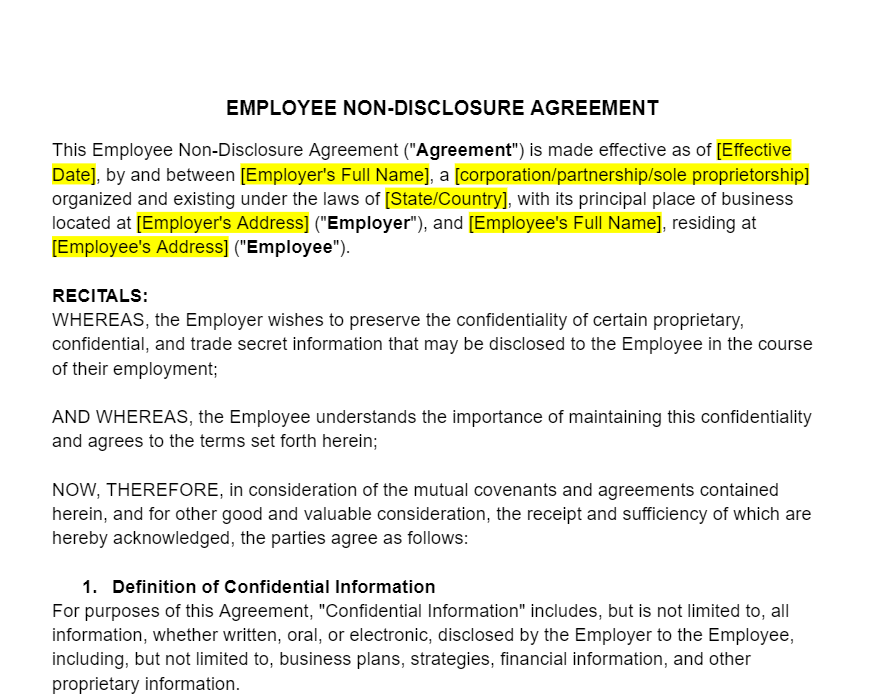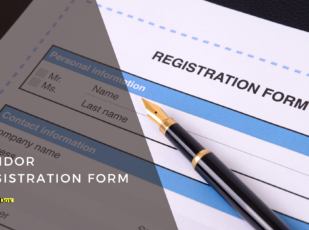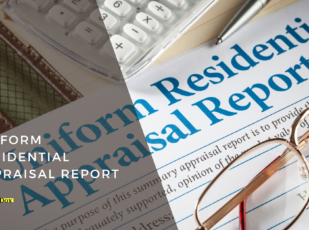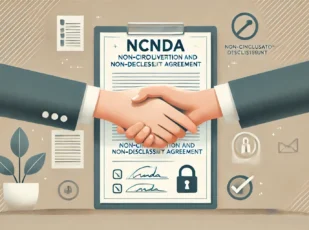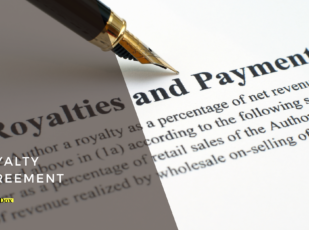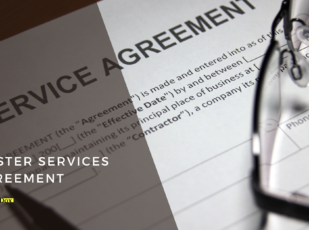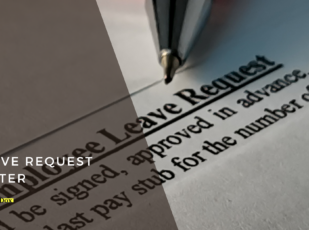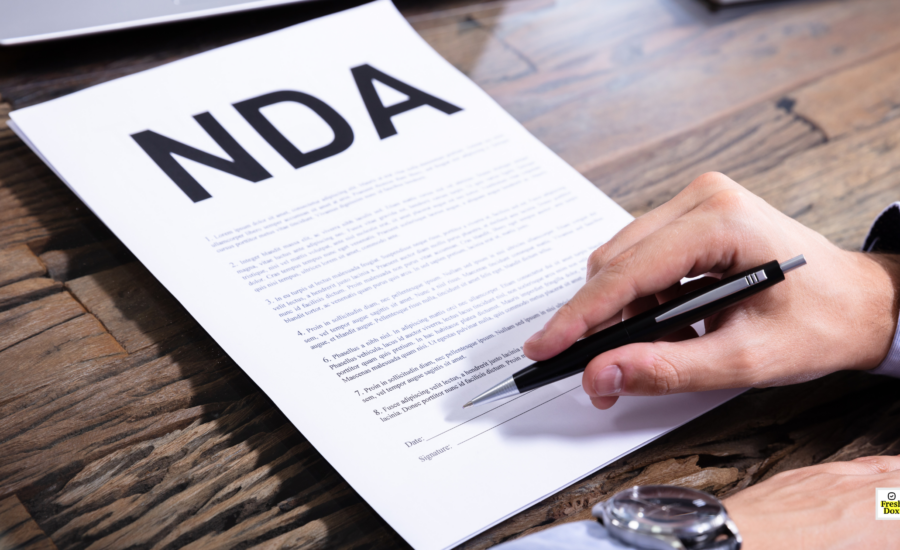
Employee Non-Disclosure Agreement
14 Downloads
Employment
February 17, 2025
Sayantani Dutta
Today’s business environment is very competitive. Businesses rely on trade secrets, market research, competitor analysis, and a host of other types of internal documentation to acquire and preserve a competitive edge. This is why safeguarding such sensitive or proprietary information has become so important today.
The Employee Non-Disclosure Agreement or NDA plays a critical role here. It protects the company’s confidential data legally. The idea behind this confidentiality agreement is to ensure that employees are legally bound to keep proprietary information private. This, in turn, secures business operations, strategies, intellectual properties, competitive edge, and so much more.
An effective NDA has become one of the most vital tools for maintaining a business’s edge in the market and for creating a secure, trustworthy work environment where sensitive business information is protected. The NDA can be a section within an employment contract or signed separately. For now, we are going to assume it is a separate document that only concerns itself with the confidentiality obligations of existing employees or new hires.
This agreement establishes the terms and conditions that protect a range of information—from business plans for product diversification to internal financial information and projections, that might need to be shared with the employees from time to time to facilitate work or improve productivity.
In this article, we are going to take a look at how the NDA protects sensitive information, what risks you might be running into if yours is not comprehensive, and what makes an ideal NDA. We will also tell you about our professionally crafted Employee Non-Disclosure Agreement Template that you can customize to fit your organizational needs while ensuring the necessary legal protections.
So, without further ado, let’s get right into it!
Understanding the Importance of an Employee Non-Disclosure Agreement
Everything from the most sensitive confidential information such as product development roadmaps to an ecommerce store’s customer list is proprietary information. Now, assume an employee who works on the backend of this ecommerce store—they will have complete access to the sales data and customer information. A competitor can make excellent use of this data when just entering the market by knowing which age groups or locations to target with their marketing campaigns. If this information is leaked in any way, the organization stands to lose considerably.
That is why employment agreements have built-in protections against this. The employee’s employment hinges on their capability to adhere to the NDA’s terms and avoid leaking, accidentally or deliberately, such information anywhere. In case of unauthorized disclosure or any other type of breach of this agreement, the organization can take legal counsel against the employee and recover their losses to maintain the competitive advantage and protect its business interests.
The importance of implementing a strong Employee Non-Disclosure Agreement, therefore, cannot be understated. For businesses that rely on proprietary data, unique processes, client information, or innovative products, an NDA provides a legal safeguard that prevents employees from disclosing sensitive information to competitors or the public.
By design, this agreement not only prevents the outflow of intellectual property but also establishes proper channels for legal recourse, well within the governing law, in the event of a breach.
Furthermore, a foundationally strong and legally sound NDA signals employees as well as stakeholders and investors that the company takes data security and confidentiality seriously. This is great for the business’s reputation for reliability and trustworthiness. If, on the other hand, you have a generic NDA, your organization’s reputation is likely to take a hit.
Risks of Not Implementing an Employee Non-Disclosure Agreement
The biggest risk? You will have no safeguard against the intentional or unintentional leak of proprietary information. You will have no legal recourse or a way to receive compensation for the loss of any competitive edge. The organization’s reputation will take a hit and in the time it takes you to get back on track, your competitors will have moved way ahead.
Even if you have used a generic template to develop your employee NDA, you are inviting pretty much the same risks as it might not cover all bases or even be enforceable under state laws.
The argument is the same—if you are not actively protecting all types of information with strong employee confidentiality clauses in a comprehensive NDA document created specifically for your organization, you are looking at severe repercussions, including monetary damages. Keep in mind that new employees might not be familiar with your internal processes entirely. They might lack the know-how of more specific behaviors that you take for granted. As such, the NDA is their only resource to consult what private information has to be protected at all costs. The same applies to former employees—as they are no longer a part of your organization, you need robust clauses to protect any information they have from getting into the wrong hands.
That is why the provisions of this agreement need to be strict and robust.
Often, the lack of a comprehensive confidentiality agreement leads to the unauthorized sharing of sensitive information, giving competitors a potential advantage and damaging the company’s market position. Additionally, without the deterrence of a strict NDA, employees might not even fully comprehend the importance of keeping business secrets or what constitutes business secrets in the first place!
This can easily lead to accidental disclosures.
All of these breaches, whether deliberate or accidental, result in financial losses, a tarnished brand reputation, and diminished customer trust. Of course, we want none of that, particularly in highly innovative or competitive industries where these risks are amplified and can significantly hinder a company’s future growth and success in the market.
The Essentials of an Employee NDA
A robust Employee Non-Disclosure Agreement should include several key components to ensure comprehensive protection and clarity for all parties involved:
- Definition of Confidential Information: Clearly specify what constitutes confidential information. This may include technical data, client lists, business methodologies, and other proprietary knowledge that needs protection.
- Obligations and Duties of the Employee: Outline the responsibilities of the employee regarding the handling and protection of confidential information. This section should detail how information should be stored and who may be privy to it.
- Duration of the Agreement: Specify the term or time period for which the NDA is enforceable. This duration may extend beyond the term of employment, covering several years after the employee has left the company.
- Exclusions from Confidential Information: Clearly define what is not considered confidential with prior written consent. This might include information that is publicly known, legally obtained from other sources, or independently developed without using confidential information.
- Consequences of Breach: Describe the penalties and potential legal actions that may be taken in the event of a violation of this agreement. This serves as a deterrent against breaches and provides a clear course of action in the event of an infraction.
- Miscellaneous Provisions: Include any additional clauses related to jurisdiction, dispute resolution methods, and any other legal specifics that protect both the employee’s rights and the company’s information.
Keep in mind that whistleblower protections are always active. If your company is harboring secrets that are against the goodwill of your customers, then every employee has full right to leak such information without facing any legal repercussions from your organization. This can even be done anonymously and you cannot protect your organization against this.
FreshDox.com’s Employee Non-Disclosure Agreement Template
Say hello to our robust, legally sound, and comprehensive Employee Non-Disclosure Agreement Template—the right starting point to customize and create your own unique NDA to protect your organization’s rights and interests! We assist companies in creating enforceable and clear non-disclosure agreements with our template. Designed by legal professionals, our template is highly adaptable to meet the specific needs of various industries and ensures that all critical aspects of confidentiality are covered.
Signing up for a FreshDox.com account gives you access to the Employee Non-Disclosure Agreement Template alongside a host of other document templates to manage other aspects of your business—such as end-user license agreements and contracts for independent contractors. Our vast catalog of business-related, legal, and professional document templates are all developed with legal precision and comprehensiveness in mind.
With the correct guidelines and content to define confidential information, outline employee obligations, and specify legal remedies for any breaches, our Employee Non-Disclosure Agreement Template provides your business with a robust tool to protect your valuable information and IPs.
Ready to take a remarkable leap in how you bolster your company’s security protocols and internal trust? Look no further! Sign up today for a FreshDox.com account today and make use of our 14-day trial period to get a taste of our Basic (up to three downloads a month) and Premium (unlimited downloads) Membership Plans. With our template, anyone can secure their business secrets effectively professionally and legally.
Popular searches:
Related Templates
Discover more templates that align with your needs and preferences.

Ready to Sign Up?
Sign up for FreshDox.com’s 7-day trial and discover why so many individuals and businesses trust us for their legal document template needs.
- Cancel any time
- 7-day free trial
- From 300+ Customer Reviews

